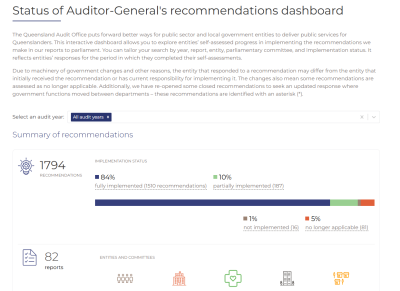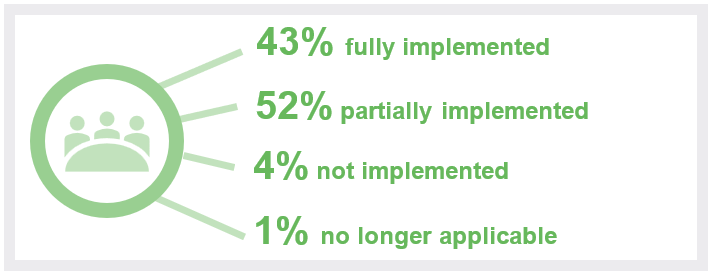Overview
The Queensland Audit Office (QAO) makes recommendations and provides insights to state and local government entities to help them improve their delivery of services. This is important work that helps make a difference to the lives of Queenslanders.
This is our fifth report to parliament on the status of Auditor-General’s recommendations. We asked 79 entities to self-assess their progress in implementing 362 recommendations from 36 QAO reports to parliament tabled between 2016–17 and 2023–24. Based on these self-assessments, we share insights on entities’ progress and highlight common challenges and opportunities for improvement.
Tabled 8 October 2025.

Report on a page
The Queensland Audit Office makes recommendations to state and local government entities to help them deliver better public services and improve the lives of Queenslanders.
In this report, we discuss the status of 92 recommendations from 6 reports tabled in 2023–24 and 270 outstanding recommendations from 30 previous reports.
We share insights on the progress entities’ reported towards implementing our recommendations. We highlight common challenges and opportunities for the public sector and ways entities can improve their systems and practices.
What did entities report to us?
Entities reported they had made the following progress in implementing our recommendations between 2016–17 and 2023–24:
Insights from entity responsesBetween 2016–17 and 2023–24:
|
Appendix B summarises entities’ self-assessed progress in implementing our recommendations. The best way to explore their reported progress on each recommendation in depth is via our interactive dashboard, which is available at www.qao.qld.gov.au/status-auditor-generals-recommendations-dashboard.

1. Insights – recommendations and responses
For this report, 79 public sector entities, including local governments, self-assessed their progress in implementing the performance audit recommendations we issued from:
- 6 new reports tabled in 2023–24
- 30 reports from earlier years that had recommendations not fully implemented.
Entities assessed whether they had fully, partially, or not implemented each recommendation, or whether the recommendation was no longer applicable (using the criteria detailed in Appendix D). To have fully implemented a recommendation, entities’ actions should address the root cause of the issues we identified.
Entities reported their progress to us in May 2025. This report reflects their self-assessed progress at that time. We have not audited the actions they have taken and therefore cannot provide assurance over their responses.
What are the recommendation categories?
We grouped our recommendations into 11 categories, as shown in Figure 1A.
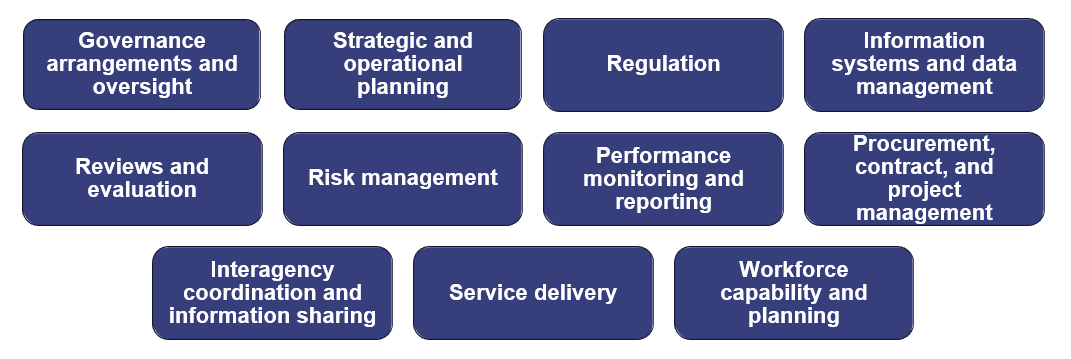
Note: While some of the categories above, like risk management, form part of governance, we have separated these to allow for deeper analysis.
Queensland Audit Office.
This year’s report includes a new category – service delivery – because of the recommendations in our 2023–24 reports. We recommended that the:
- Queensland Police Service reviews its service delivery model to improve its ability to meet demand for its services and to monitor bail checks for serious repeat offenders
- Department of Youth Justice and Victim Support improves the services it delivers to young offenders transitioning from detention into the community.
We revised the titles of 3 categories we have used in prior reports (governance, strategic planning, and regulation and oversight) to be clearer about what the categories involve.
Our interactive dashboard captures all recommendation categories from prior years, and is available at www.qao.qld.gov.au/status-auditor-generals-recommendations-dashboard.
Appendix C explains the categories.
What are the most frequent recommendations?
Figure 1B shows the 3 most common categories of all recommendations we made in 36 performance audit reports from 2016–17 to 2023–24. It also shows some of the underlying issues the recommendations sought to address.
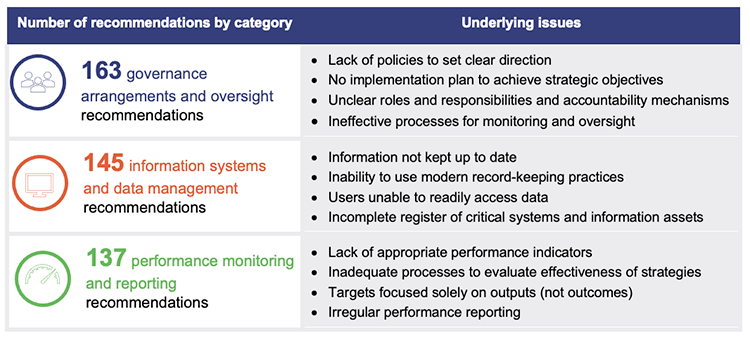
Queensland Audit Office, using data self-reported by entities.
What are the recommendations that entities implemented the least?
The most common types of outstanding recommendations related to:
- strategic and operational planning
- information systems and data management
- workforce capability and planning.
Figure 1C shows the status of these.

Note: There are 203 outstanding recommendations in total from reports tabled from 2016–17 to 2023–24.
Queensland Audit Office, using data self-reported by entities.
Strategic and operational planning
Between 2016–17 to 2023–24, we made 116 recommendations about strategic and operational planning. They focused on strengthening entities’ planning approaches, including in setting strategic priorities, aligning funding, and clearly defining roles and responsibilities.
Thirty-five per cent of these recommendations remain outstanding. Many of these are from 3 reports:
- 9 are from Forecasting long-term sustainability of local government (Report 2: 2016–17)
- 5 are from Improving asset management in local government (Report 2: 2023–24)
- 5 are from Keeping people safe from domestic and family violence (Report 5: 2022–23).
Of the 41 outstanding recommendations, entities have partially implemented 40. They have not implemented the other one.
Entities reported that these recommendations remain outstanding due to a lack of available funding, competing priorities, and other factors. We discuss some challenges that entities faced in implementing recommendations from these reports in Chapter 2.
Information systems and data management
Between 2016–17 to 2023–24, we made 145 recommendations about information systems and data management. They focused on improving the accuracy of entities’ information and on how they capture and share information.
Of the 145 recommendations, 19 per cent (28) remain outstanding. Entities reported partially implementing 25 recommendations and not implementing the remaining 3.
Almost half of the outstanding recommendations are from our report Implementing machinery of government changes (Report 17: 2022–23). Some entities reported they were in the process of transitioning to new digital record management systems to improve the sharing of information and the retention and disposal of information.
Some of the information systems and data management recommendations focus on improving integration between entities’ systems. Some entities reported that these recommendations remained outstanding because they were collaborating with other entities to ensure their systems were compatible.
Workforce capability and planning
Between 2016–17 to 2023–24, we made 98 recommendations about workforce capability and planning. They focused on entities developing strategies to build adaptable workforces, and on implementing more contemporary recruitment practices to attract the right staff.
Of the 98 recommendations, 29 per cent (28) remain outstanding. Entities reported partially implementing 26 recommendations and not implementing the remaining 2.
Many of these recommendations are from our report Managing workforce agility in the Queensland public sector (Report 6: 2022–23). Entities reported that they are developing strategies and action plans to address workforce gaps, but they are yet to finalise these. Some entities reported that recommendations were outstanding because they were trialling new workforce planning approaches to address their current and future skills gaps.

2. Overall status of implementation
In this chapter, we discuss the progress that entities have reported in implementing the 362 performance audit recommendations from 36 reports tabled between 2016–17 and 2023–24. They include:
- 92 recommendations from 6 reports tabled in 2023–24
- 270 recommendations from 30 reports tabled between 2016–17 and 2022–23. These are recommendations that entities reported as outstanding (partially implemented and not implemented) in last year’s report.
We begin with the overall status of implementation, including progress by report, status of recommendations from prior years, and timeliness to implement recommendations. We then report on the implementation of recommendations specifically by departments, hospital and health services, local governments, and other entities.
Overall status of implementation
Entities reported they had fully implemented 43 per cent (156) of the 362 recommendations. They stated that 56 per cent (203) remain outstanding and one per cent (3) were no longer applicable. Figure 2A shows the overall status of the 362 recommendations.
Appendix B includes a list of the reports we asked entities to self-assess against, and a summary of their self-assessed progress.
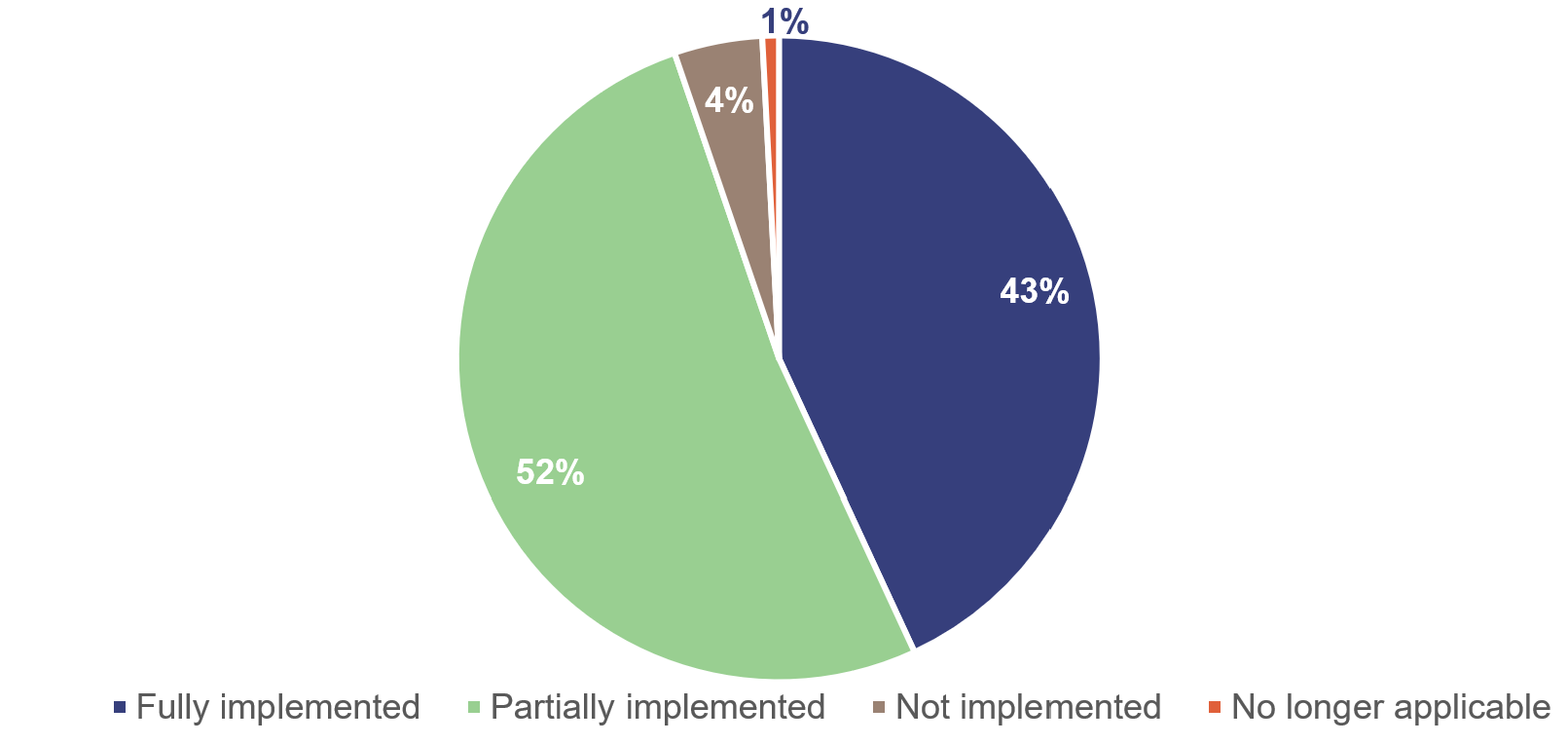
Queensland Audit Office, using data self-reported by entities.
Status of recommendations by report
Entities reported fully implementing all recommendations from 5 reports:
- Managing consumer food safety in Queensland (Report 17: 2018–19)
- Managing coal seam gas activities (Report 12: 2019–20)
- Awarding of sports grants (Report 6: 2020–21)
- Managing Queensland’s transition to renewable energy (Report 5: 2021–22)
- Managing Queensland’s COVID-19 economic response and recovery (Report 3: 2022–23).
Figure 2B shows the status of the 31 reports with outstanding recommendations this year. It does not show all recommendations from these reports that entities have fully implemented or assessed as no longer applicable in prior years.
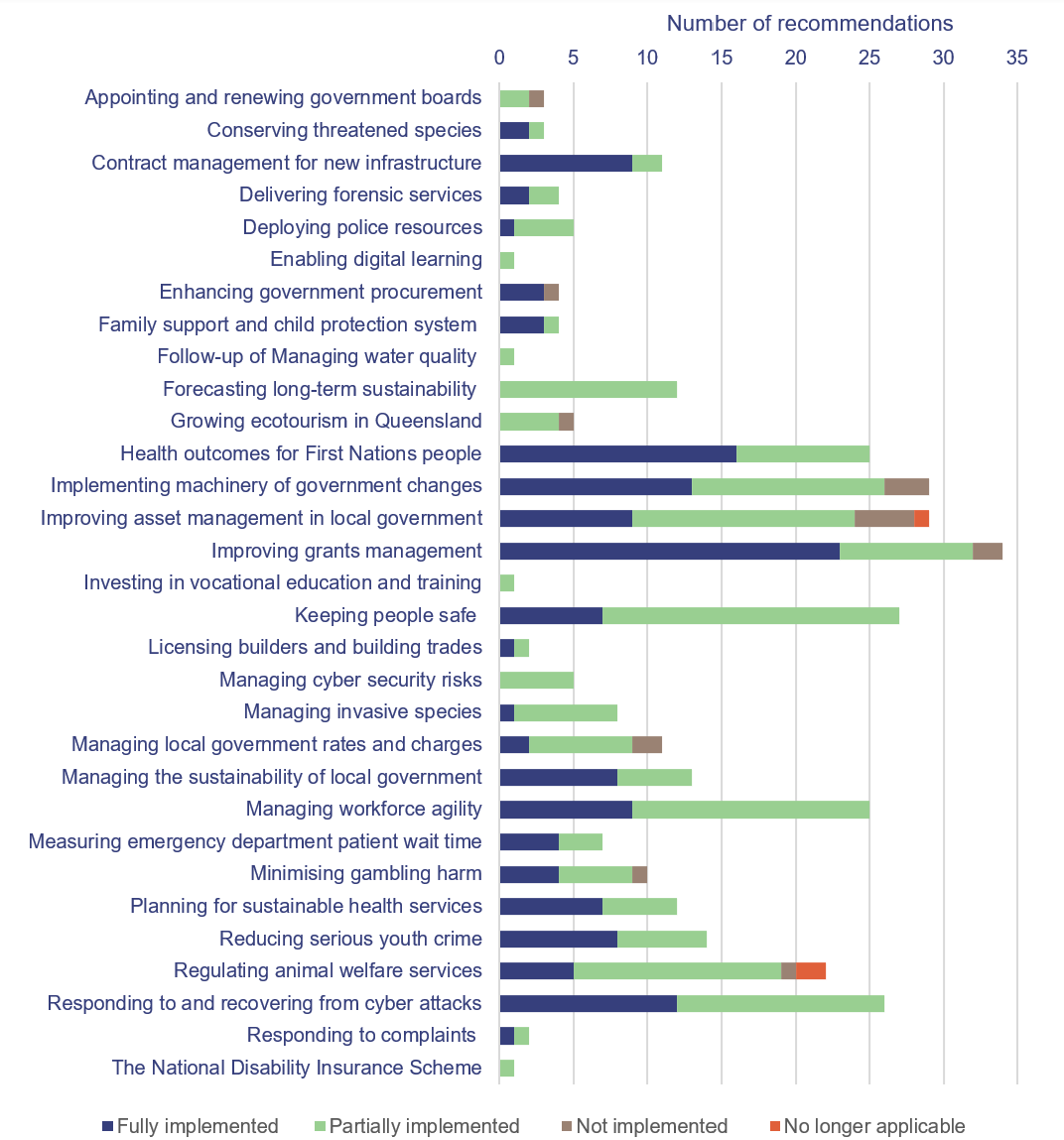
Full titles of shortened report headings: Follow-up of Managing water quality – Follow-up of Managing water quality in Great Barrier Reef catchments; Forecasting long-term sustainability – Forecasting long-term sustainability of local government; Keeping people safe – Keeping people safe from domestic and family violence; Managing the sustainability of local government – Managing the sustainability of local government services; Managing workforce agility – Managing workforce agility in the Queensland public sector; Responding to complaints – Responding to complaints from people with impaired capacity–Part 1: The Public Trustee of Queensland.
Queensland Audit Office, using data self-reported by entities.
Status of outstanding recommendations from prior years
In our report 2024 status of Auditor-General’s recommendations (Report 1: 2024–25), we reported that 275 recommendations were outstanding. Five recommendations are no longer applicable because of the machinery of government changes in November 2024.
Of the remaining 270 recommendations, entities reported this year that they have:
- fully implemented 45 per cent (121)
- partially implemented 50 per cent (136)
- not implemented 4 per cent (11).
They reported that the remaining one per cent (2) of recommendations were no longer applicable.
Figure 2C shows the number of outstanding recommendations from last year’s report compared to the number of outstanding recommendations this year.
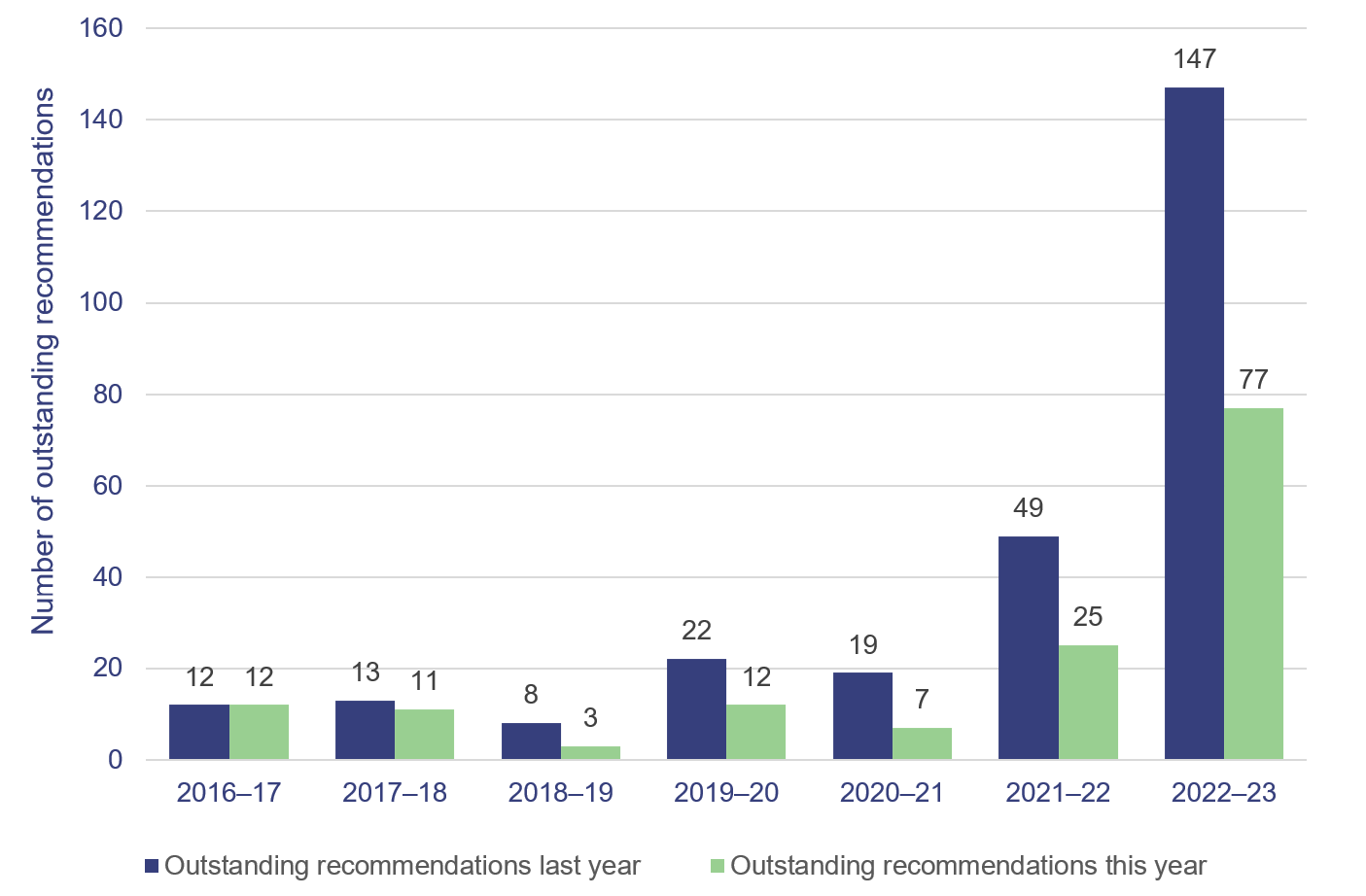
Queensland Audit Office, using data self-reported by entities.
Entities have made limited progress in implementing outstanding recommendations from our reports tabled between 2016–17 and 2017–18. They reported not implementing any of the outstanding recommendations from reports tabled in 2016–17 and only implementing 2 of the 13 from 2017–18.
Status of outstanding recommendations from 2016–17
The 12 outstanding recommendations in 2016–17 are from our report Forecasting long-term sustainability of local government (Report 2: 2016–17).
Case study 1 (Figure 2D) explains the lack of progress with these recommendations.
| Forecasting long-term sustainability of local government (Report 2: 2016–17) |
|---|
We tabled our report Forecasting long-term sustainability of local government (Report 2: 2016–17) in October 2016. We made 9 recommendations, including:
These recommendations focused on improving the quality of financial planning and long-term forecasts. Entities reported that they have implemented 52 per cent (13) of the 25 recommendations. The remaining 12 recommendations are still outstanding and are now 8–9 years old. Of these, 11 are for councils. They reported having partially implemented these recommendations, including updating their asset registers and improving their financial planning approaches. Councils reported that a range of barriers have hindered their progress in fully implementing these recommendations. Some said they lack the capability to undertake forecasting and financial planning and instead rely on contractors. Others said their old information technology systems affect their ability to integrate information between their asset and finance functions. The now Department of Local Government, Water and Volunteers plans to address its outstanding recommendation as part of a wider reform when it reviews the local government regulations in 2026. |
Queensland Audit Office, using data provided by entities.
Status of outstanding recommendations in 2017–18
Of the 11 outstanding recommendations in 2017–18, 9 are from our report Managing local government rates and charges (Report 17: 2017–18). The entities have partially implemented 7 recommendations and not implemented 2. Some councils mentioned high staff turnover, competing priorities, and a lack of expertise as barriers to implementing these recommendations, which are now 6–7 years old.
The remaining 2 outstanding recommendations are from our reports The National Disability Insurance Scheme (Report 14: 2017–18) and Follow-up of Managing water quality in Great Barrier Reef catchments (Report 16: 2017–18). The entities have partially implemented these 2 recommendations and expect to finalise them by December 2025.
Timeliness of implementation
When developing our recommendations, we ask entities to state whether they agree with them and when they plan to implement them. Entities that set a time frame for implementing recommendations promote accountability and good governance. When they implement recommendations in a timely manner, they can address root cause issues quickly and realise the full benefits of the recommended action.
Between 2021–22 to 2023–24, entities provided a time frame for the implementation of 168 recommendations. Our analysis identified that 36 recommendations are overdue that entities still need to implement, 22 recommendations are not yet due, and there are 3 recommendations which entities assessed as no longer applicable. We could not assess whether entities implemented recommendations by the due date because they report their progress annually and there were limitations with the data. We considered a timely implementation as one where entities reported the recommendation as fully implemented the first time we followed up the status after the due date.
We analysed the time entities took to implement the remaining 107 recommendations:
- 79 per cent (85) were timely
- 21 per cent (22) were not timely.
We analysed the 22 recommendations that were implemented late and found 55 per cent (12) of these were from our report Contract management for new infrastructure (Report 16: 2021–22). Two departments implemented these recommendations late but did not explain why.
Progress with implementation by type of entity
In the following section, we breakdown progress in implementing recommendations by departments, hospital and health services, local governments, and other entities.
Departments
We asked 22 departments to self-assess their progress in implementing 47 recommendations that we made to them in 2023–24 and 153 recommendations outstanding from previous years. They reported implementing 46 per cent (93) of the 200 recommendations, most of which were outstanding from previous years.
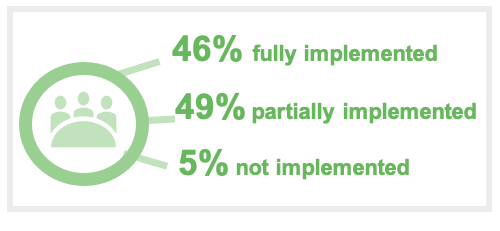
Note: Figures show the status of recommendations made in 2023–24 and outstanding recommendations from prior years using data self-reported by entities.
Queensland Audit Office.
The following departments reported fully implementing all recommendations:
- Department of Natural Resources and Mines, Manufacturing and Regional and Rural Development
- Department of State Development, Infrastructure and Planning
- Queensland Treasury.
The other 19 departments reported that they had outstanding recommendations, as shown in Figure 2F.
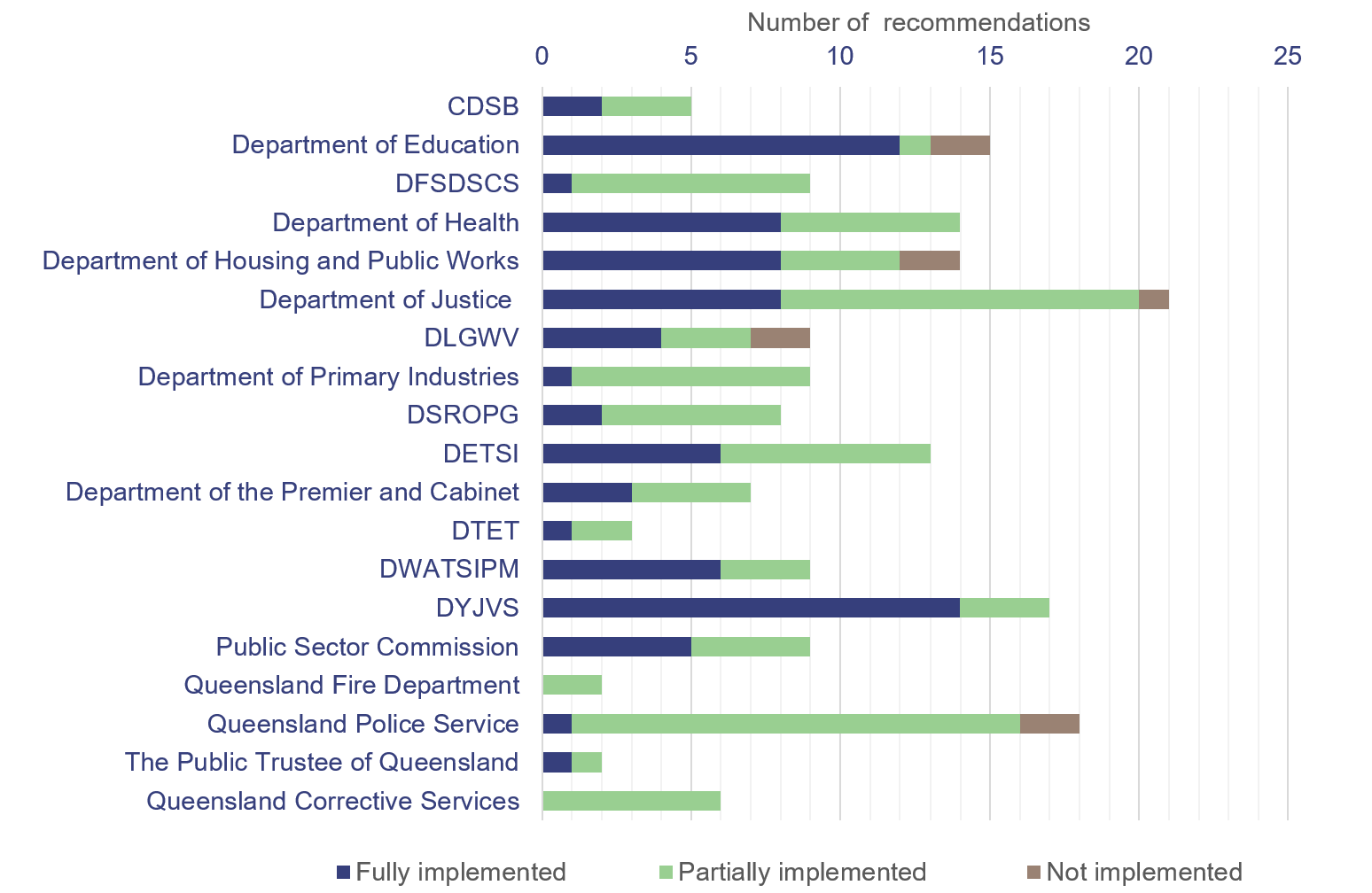
Note: CDSB – Department of Customer Services, Open Data and Small and Family Business; DFSDSCS – Department of Families, Seniors, Disability Services and Child Safety; DLGWV – Department of Local Government, Water and Volunteers; DSROPG – Department of Sport, Racing and Olympic and Paralympic Games; DETSI – Department of the Environment, Tourism, Science and Innovation; DTET – Department of Trade, Employment and Training; DWATSIPM – Department of Women, Aboriginal and Torres Strait Islander Partnerships and Multiculturalism; DYJVS – Department of Youth Justice and Victim Support.
Queensland Audit Office, using data self-reported by entities.
The remaining 54 per cent (107) of the 200 recommendations remain outstanding.
The Queensland Police Service has the greatest number of outstanding recommendations, with 17 (15 partially implemented and 2 not implemented). Nine of these recommendations are from 2 reports:
- Deploying police resources (Report 4: 2023–24)
- Reducing serious youth crime (Report 15: 2023–24).
One outstanding Queensland Police Service recommendation was for it to monitor bail compliance for serious repeat offenders. It reported that it would implement this by September 2024. The youth bail framework and response pilot commenced in November 2024. The Queensland Police Service has commenced a final evaluation of the pilot and will use this to determine feasibility of rolling this out across the state.
The Department of Justice has the second highest number of outstanding recommendations, with 13. It has partially implemented 12 and not implemented one. Of the 13 recommendations, 6 come from Minimising gambling harm (Report 9: 2023–24), which we tabled in February 2024. The Department of Justice has partially implemented 5 of these and not implemented one. The department has developed new education materials and delivered campaigns to raise awareness about gambling harm. It still needs to deliver other prevention initiatives and implement a new framework to measure the outcomes of its gambling harm prevention initiatives. It plans to do this in late 2025.
Hospital and health services
We made no new recommendations to hospital and health services (HHSs) in our reports tabled in 2023–24. However, we asked 15 HHSs to self-assess their progress in implementing 50 recommendations that were outstanding from previous years. We did not ask Children’s Health Queensland Hospital and Health Service to self-assess its progress because it did not have any outstanding recommendations from last year.
The HHSs reported fully implementing 58 per cent (29) of the 50 recommendations.
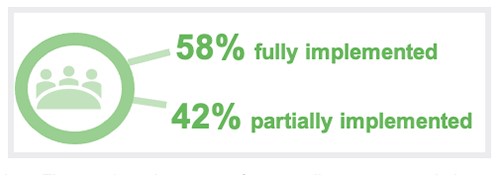
Note: Figures show the status of outstanding recommendations from prior years using data reported by entities.
Queensland Audit Office.
The following HHSs reported fully implementing all recommendations:
- North West Hospital and Health Service
- Sunshine Coast Hospital and Health Service
- West Moreton Hospital and Health Service.
Figure 2H shows the HHSs with outstanding recommendations.
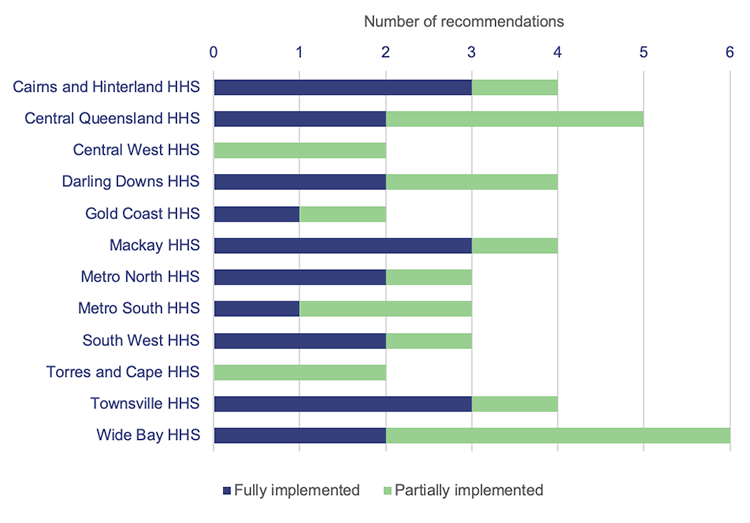
Queensland Audit Office, using data self-reported by entities.
The HHSs reported 42 per cent (21) of the 50 recommendations we made to them remain outstanding. Health outcomes for First Nations people (Report 14: 2022–23) and Keeping people safe from domestic and family violence (Report 5: 2022–23) had the most outstanding recommendations.
The HHSs reported good progress in implementing the outstanding recommendations from Health outcomes for First Nations people (Report 14: 2022–23). They stated that they have fully implemented 64 per cent (16) of the 25 outstanding recommendations from this report and partially implemented the remaining 9 recommendations. They reported developing and implementing new health equity strategies and plans to improve health outcomes for First Nations people. Some HHSs reported that they have increased access to healthcare services and now offer more support to help First Nations people attend medical appointments.
In Keeping people safe from domestic and family violence (Report 5: 2022–23) we made one recommendation to 13 HHSs (13 recommendations in total). We recommended they strengthen their screening and risk assessment practices. HHSs have reported limited progress in implementing this recommendation. They stated they have implemented 31 per cent (4) and partially implemented the remaining 9. They will need to give priority to implementing this recommendation to ensure they appropriately train their frontline health workers to undertake risk assessments.
Local governments
We asked 27 local governments (councils) to self-assess their progress in implementing the 25 recommendations we made to them in 2023–24 and 47 outstanding recommendations from previous years.
They reported they have implemented 26 per cent (19) of the 72 recommendations, as shown in Figure 2I.
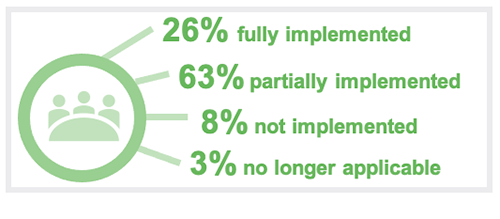
Note: Figures show the status of recommendations made in 2023–24 and outstanding recommendations from prior years using data self-reported by councils.
Queensland Audit Office.
The following 6 councils reported fully implementing all recommendations:
- Brisbane City Council
- Fraser Coast Regional Council
- Longreach Regional Council
- Scenic Rim Regional Council
- Tablelands Regional Council
- Western Downs Regional Council.
Figure 2J shows the status of recommendations by the 21 councils that have outstanding recommendations.
Councils vary widely in their size and location, and in the range of community services they provide. To enable comparison, we have grouped them into the 5 common segments used by the Local Government Association of Queensland: Coastal, Resources, Rural/Regional, Rural/Remote, and South East Queensland.
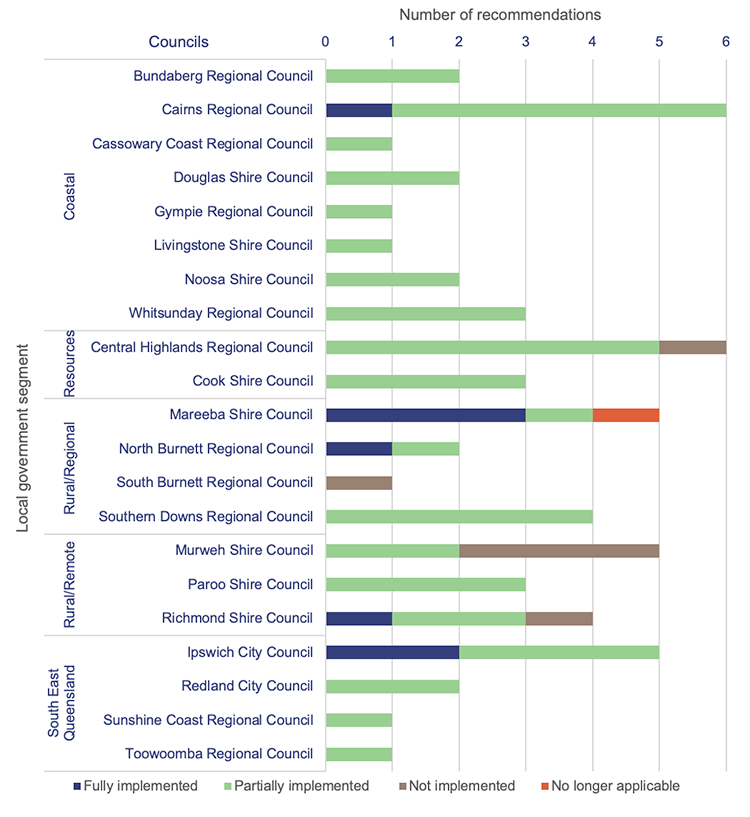
Queensland Audit Office, using data self-reported by entities.
Councils reported that 71 per cent (51) of the 72 recommendations remain outstanding. The outstanding recommendations come from 5 reports. Improving asset management in local government (Report 2: 2023–24) had the highest number of outstanding recommendations.
Improving asset management in local government
In Improving asset management in local government (Report 2: 2023–24), we made 9 recommendations – 4 to the former Department of State Development, Infrastructure, Local Government and Planning and 5 recommendations to 5 councils. In total, we made 25 recommendations to councils.
We recommended councils foster a holistic approach to managing their assets, ensure their asset management plans are up to date, and build their asset management capabilities. We also recommended they regularly report on the status of these recommendations to their audit committees.
Of the 25 recommendations that we made to councils, they reported:
- fully implementing 24 per cent (6)
- partially implementing 56 per cent (14)
- not implementing 16 per cent (4).
The remaining 4 per cent (1) were assessed as no longer applicable.
Of the 18 recommendations outstanding from that report, 83 per cent (15) are now overdue. These overdue recommendations relate to councils’ approach and planning to managing their assets. Some councils have begun reviewing and updating their asset management plans, but they still need to finalise them. Others are in the process of strengthening how they monitor and oversee assets.
Outstanding recommendations from previous years
As with last year, councils have made limited progress in implementing outstanding recommendations from previous years. They reported only implementing 28 per cent (13) of the 47 outstanding recommendations from last year’s report.
In 2025–26, we plan to undertake an audit on Improving the sustainability of local governments. This will be the fifth in our series of local government sustainability audits. We will examine councils’ progress in implementing our recommendations from our series.
Statutory bodies and other state entities
We asked statutory bodies and some other state entities to self-assess their progress in implementing the 20 recommendations we made to them in 2023–24 and 20 outstanding recommendations from last year’s report. Some of the entities that we followed up need to remain anonymous to ensure we do not compromise their security.
The entities reported fully implementing 38 per cent (15) of the 40 recommendations.
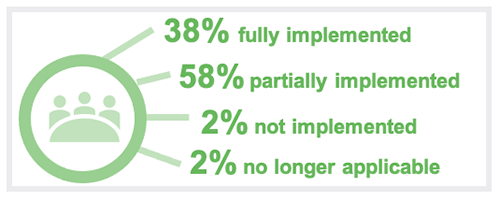
Note: Figures show the status of recommendations made in 2023–24 and outstanding recommendations from prior years using data self-reported by entities.
Queensland Audit Office.
The following statutory bodies reported fully implementing all recommendations:
- Coexistence Queensland
- Professional Standards Council
- Surveyors Board of Queensland.
Figure 2L shows the status of recommendations by the 8 statutory bodies and 5 anonymous entities that have outstanding recommendations.
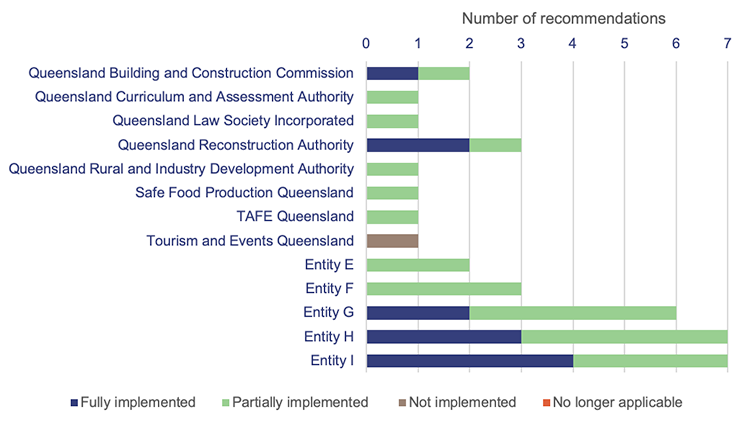
Note: We have not named entities E to I to ensure we do not compromise their security.
Queensland Audit Office, using data self-reported by entities.

